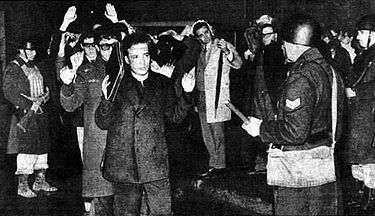La Noche de los Bastones Largos

La Noche de los Bastones Largos ("The Night of the Long Batons") was the violent dislodge of five faculties of the University of Buenos Aires (UBA) in Argentina on July 29, 1966 by the Federal Police. The departments had been taken by the students, professors and graduates (members of the autonomous government of the university) who opposed the military government's measure of intervening the universities and revoke the regime of the 1918 university reform.
Background
On June 28, 1966, a coup led by General Juan Carlos Onganía had overthrown elected president Arturo Illia and started the military government known as the Revolución Argentina.
The Argentine public universities were by then organised as dictated by the university reform, which established the autonomy of the university, and a political power divided in a tripartite government of students, professors and graduates.
The repression was particularly violent in the faculties of Exact and Natural Sciences and Philosophy and Literature of the UBA.
The name given to the events refers to the long batons used by the police to hit students, professors and graduates while taking them out detained of the buildings. 400 people were detained, with laboratories and libraries completely destroyed.
Consequences
In the following months hundreds of professors were fired, resigned their positions or abandoned the country.
In total, 301 university professors emigrated, of whom 215 were scientists, and 166 found their place in other Latin American universities, mainly in Chile and Venezuela. 94 went to universities of United States, Canada and Puerto Rico, and 41 moved to Europe.[1]
In some cases, complete research teams were dismantled, such as the Instituto de Cálculo de Ciencias Exactas, where the first computer in Latin America was functioning. All of its 70 members resigned and left the country. Similar cases were those of the Instituto de Psicología Evolutiva and the Instituto de Radiación Cósmica.
Some of the better known affected professors were:
- Sergio Bagú, historian and sociologist, one of the pioneers of the Theory of dependence. Exiled
- Manuel Sadosky, pioneer of Computer Science in the country. Exiled
- Gregorio Klimovsky, epistemology; one of the most important figures in logical mathematics and philosophy of science in the country.
- Pablo Miguel Jacovkis, mathematician, dean of the FCEyN, president of the CONICET (1999~2000).
- Rolando García, meteorology, worked with Jean Piaget. Exiled.
- Félix González Bonorino, most important geology scientist of the country.
- Tulio Halperín Donghi, among Latin America's most renowned historians.
- Risieri Frondizi, philosopher and ex-dean of the UBA.
- Juan G. Roederer, astronomer in charge of the Instituto de Radiación Cósmica.
- Catherine Cesarsky, world-wide known astronomer, since 2006 president of the International Astronomical Union.
- Telma Reca, psychologist, director of the Instituto de Psicología Evolutiva, fired.
- Mariana Weissmann, atomic physician, receiver of the L'Oréal-Unesco award 2003, and first woman incorporated to the Academia Argentina de Ciencias Exactas, Físicas y Naturales. Exiled
Dismantling of the reformist university
With the intervention of the military government to the universities, a strict censorship was applied to the contents of the programs, and the scientific project of tight relationship between education and investigation in the universities.
The act of the military government is considered a central reference of the cultural and academic decadence, and the brain drain in Argentina.
Recognition and memory
In 2004 film director Tristán Bauer presented his documentary film La noche de los bastones largos: el futuro intervenido, based in the events of July 29, 1966.
In July 2005 the Federación Universitaria Argentina delivered recognition diplomas to the 70 professors that resigned in 1966 to their positions at the Faculty of Agronomy of the University of Buenos Aires
See also
- University Revolution
- List of universities in Argentina
- List of cases of police brutality in Argentina
References
- ↑ Marta Slemenson, "Emigración de científicos argentinos", 1970:118
Bibliography
- Morero, Sergio; Ariel Eidelman, Ariel; y Lichtman, Guido. La noche de los bastones largos, 2nd ed. Buenos Aires: Nuevohacer Grupo Editor Latinoamericana, 2002. Collection: Colección Temas. ISBN 950-694-684-1.
External links
- Police repression at the Universidad de Buenos Aires at the Wayback Machine (archived July 20, 2011), University of Toronto
- (Spanish) Events - Ortiba.org
- (Spanish) La ciencia corrida - Clarín
- (Spanish) La Noche de los Bastones Largos, the 30 anniversary book
- (Spanish) La noche de los bastones largos